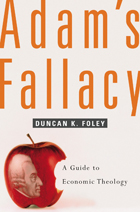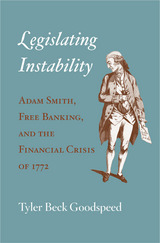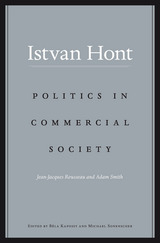

This book could be called “The Intelligent Person’s Guide to Economics.” Like Robert Heilbroner’s The Worldly Philosophers, it attempts to explain the core ideas of the great economists, beginning with Adam Smith and ending with Joseph Schumpeter. In between are chapters on Thomas Malthus, David Ricardo, Karl Marx, the marginalists, John Maynard Keynes, Friedrich Hayek, and Thorstein Veblen. The title expresses Duncan Foley’s belief that economics at its most abstract and interesting level is a speculative philosophical discourse, not a deductive or inductive science. Adam’s fallacy is the attempt to separate the economic sphere of life, in which the pursuit of self-interest is led by the invisible hand of the market to a socially beneficial outcome, from the rest of social life, in which the pursuit of self-interest is morally problematic and has to be weighed against other ends.
Smith and his successors argued that the market and the division of labor that is fostered by it result in tremendous gains in productivity, which lead to a higher standard of living. Yet the market does not address the problem of distribution—that is, how is the gain in wealth to be divided among the classes and members of society? Nor does it address such problems as the long-run well-being of the planet.
Adam’s Fallacy is beautifully written and contains interesting observations and insights on almost every page. It will engage the reader’s thoughts and feelings on the deepest level.

After laying out a range of meanings for the concept of empathy, Fleischacker proposes that what Smith called “sympathy” is very much what we today consider empathy. Smith’s version has remarkable value, as his empathy calls for entering into the perspective of another—a uniquely human feat that connects people while still allowing them to define their own distinctive standpoints. After discussing Smith’s views in relation to more recent empirical and philosophical studies, Fleischacker shows how turning back to Smith promises to enrich, clarify, and advance our current debates about the meaning and uses of empathy.

In a brilliant recreation of the epoch between the 1770s and the 1820s, Emma Rothschild reinterprets the ideas of the great revolutionary political economists to show us the true landscape of economic and political thought in their day, with important consequences for our own. Her work alters the readings of Adam Smith and Condorcet--and of ideas of Enlightenment--that underlie much contemporary political thought.
Economic Sentiments takes up late-eighteenth-century disputes over the political economy of an enlightened, commercial society to show us how the "political" and the "economic" were intricately related to each other and to philosophical reflection. Rothschild examines theories of economic and political sentiments, and the reflection of these theories in the politics of enlightenment. A landmark in the history of economics and of political ideas, her book shows us the origins of laissez-faire economic thought and its relation to political conservatism in an unquiet world. In doing so, it casts a new light on our own times.

This reprint of Edwin Cannan's definitive 1904 edition of The Wealth of Nations includes Cannan's famous introduction, notes, and a full index, as well as a new preface written especially for this edition by the distinguished economist George J. Stigler. Mr. Stigler's preface will be of value for anyone wishing to see the contemporary relevance of Adam Smith's thought.

From 1716 to 1845, Scotland’s banks were among the most dynamic and resilient in Europe, effectively absorbing a series of adverse economic shocks that rocked financial markets in London and on the continent. Legislating Instability explains the seeming paradox that the Scottish banking system achieved this success without the government controls usually considered necessary for economic stability.
Eighteenth-century Scottish banks operated in a regulatory vacuum: no central bank to act as lender of last resort, no monopoly on issuing currency, no legal requirements for maintaining capital reserves, and no formal limits on bank size. These conditions produced a remarkably robust banking system, one that was intensely competitive and served as a prime engine of Scottish economic growth. Despite indicators that might have seemed red flags—large speculative capital flows, a fixed exchange rate, and substantial external debt—Scotland successfully navigated two severe financial crises during the Seven Years’ War.
The exception was a severe financial crisis in 1772, seven years after the imposition of the first regulations on Scottish banking—the result of aggressive lobbying by large banks seeking to weed out competition. While these restrictions did not cause the 1772 crisis, Tyler Beck Goodspeed argues, they critically undermined the flexibility and resilience previously exhibited by Scottish finance, thereby elevating the risk that another adverse economic shock, such as occurred in 1772, might threaten financial stability more broadly. Far from revealing the shortcomings of unregulated banking, as Adam Smith claimed, the 1772 crisis exposed the risks of ill-conceived bank regulation.

Scholars normally emphasize the contrast between the two great eighteenth-century thinkers Jean-Jacques Rousseau and Adam Smith. Rousseau is seen as a critic of modernity, Smith as an apologist. Istvan Hont, however, finds significant commonalities in their work, arguing that both were theorists of commercial society and from surprisingly similar perspectives.
In making his case, Hont begins with the concept of commercial society and explains why that concept has much in common with what the German philosopher Immanuel Kant called unsocial sociability. This is why many earlier scholars used to refer to an Adam Smith Problem and, in a somewhat different way, to a Jean-Jacques Rousseau Problem. The two problems—and the questions about the relationship between individualism and altruism that they raised—were, in fact, more similar than has usually been thought because both arose from the more fundamental problems generated by thinking about morality and politics in a commercial society. Commerce entails reciprocity, but a commercial society also entails involuntary social interdependence, relentless economic competition, and intermittent interstate rivalry. This was the world to which Rousseau and Smith belonged, and Politics in Commercial Society is an account of how they thought about it.
Building his argument on the similarity between Smith’s and Rousseau’s theoretical concerns, Hont shows the relevance of commercial society to modern politics—the politics of the nation-state, global commerce, international competition, social inequality, and democratic accountability.
READERS
Browse our collection.
PUBLISHERS
See BiblioVault's publisher services.
STUDENT SERVICES
Files for college accessibility offices.
UChicago Accessibility Resources
home | accessibility | search | about | contact us
BiblioVault ® 2001 - 2024
The University of Chicago Press









